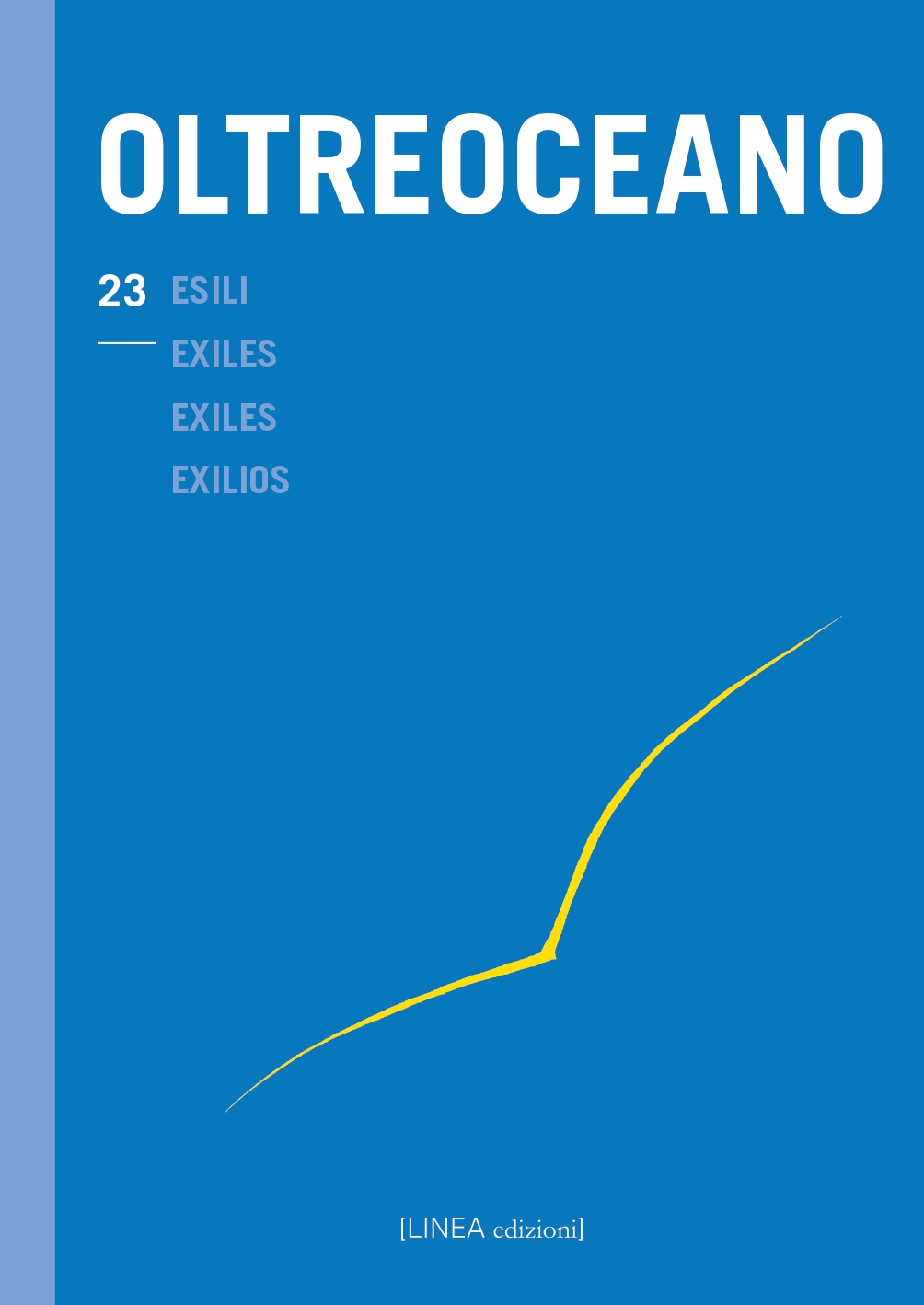Exile, a "Second Chance" According to Felicia Mihali?
DOI:
https://doi.org/10.53154/Oltreoceano107Keywords:
Exile, Felicia Mihali, Transnational Subject, Home Country, Host CountryAbstract
In 2000, disillusioned with Romania's economic situation, Felicia Mihali moved to Montreal, Quebec. There, in the "belle province", by translating into French books she had published in Romania before leaving, she joined a group of migrant writers that included Émile Ollivier, Dany Laferrière, Naïm Kattan, Ying Chen, Abla Farhoud, Marco Micone, Sergio Kokis and others. Initially, she gave her books a second chance through self-translation, and later adopted French and English as her writing languages. Limiting my contribution to the analysis of three of her novels written in French (La reine et le soldat, Dina and La Bigame), the titles of which explicitly refer to women, I propose to examine how the experience of exile is captured in the journey of characters who cross borders and seek to become accustomed to the habits and customs of their host country. Felicia Mihali's writings often conjure up the image of an exile corresponding to what Janet Paterson (2009: 15-16) calls a "transnational subject", i.e. "an emigrant who has either chosen or been forced to leave his or her country of origin. But [...] s/he rejects the notion of an identity formed on the criteria of race or place of origin, in favour of a complex, shifting identity that is often multicultural and outside the confines of memories". Consequently, by modelling the title of my article on the title of her novel, A Second Chance for Adam, I aim to show that in her novels, exile, experienced in a positive way, represents a second chance, given that the protagonists are characterized by a desire for openness and integration into another geographical, linguistic and cultural space.
Downloads
References
Andrei, C. (2016): Simplement aimer, dit-elle. Images de la femme dans les autofictions de Felicia Mihali. La Revue Roumaine d’Études Francophones, 8, pp. 30-48.
Athlan, A. (2014): La psychologie sur la voie de l’exil. Le journal des psychologies, 2, 315, pp. 59-63.
Eiben, I. N. (2011): L’élément autobiographique et sa fictionnalisation dans le roman Dina de Felicia Mihali. In K-D Ertler, M. Löschnigg, & Y. Völkl (Éds.), Cultural Constructions of Migration in Canada/ Constructions culturelles de la migration au Canada (pp. 155-164). Frankfurt: Peter Lang.
Fins, A. G. (2017): L’exil intime qui nous fonde. Carnets, Deuxième série – 10/2017. Tiré de http://journals.openedition.org/ carnets/2255 (Consulté le 27/06/2024).
Gyurcsik, M. (2004): La neige, la même et autre, Essai sur le roman québécois contemporain. Timișoara: Editura Universităţii de Vest.
Ionescu, M. (2014a): De l’endurance à la résilience: les romans de Felicia Mihali. Dialogues francophones, 19, pp. 21-31.
Ionescu, M. (2023): (S)’Écrire dans l’entre-deux. Récits de femmes d’ici et d’ailleurs. Lausanne, Berlin, Bruxelles, Chennai, New York, Oxford: Peter Lang.
Jouve, V. (2001): L’effet-personnage dans le roman. Paris: PUF écriture.
Laferrière, D. (2009): L’énigme du retour. Montréal: Boréal.
Mihali, F. (2005): La reine et le soldat. Montréal: XYZ.
Mihali, F. (décembre 2006): Le pays mère. Terra Nova Magazine. Tiré de www.terranovamagazine.ca (Consulté le 14/06/ 2010).
Mihali, F. (2008): Dina. Montréal: XYZ.
Mihali, F. (2022): La bigame. Montréal: Hashtag.
Nouss, A. (2015): La condition de l’exilé. Penser les migrations contemporaines. Paris: Maison des sciences de l’homme.
Paterson, J. (2009, Printemps): Le sujet en mouvement: Postmoderne, migrant et transnational. NEF, Dossier Avatars du sujet, 24, 1, pp. 10-18.
Pavel, T. (2003): Fiction et perplexité morale - XXVe Conférence Marc-Bloch, 10 juin 2003. Tiré de https://www.ehess.fr/sites/default/files/pagedebase/fichiers/thomas_pavel.pdf (Consulté le 10/05/2024).
Pavel, T. (2017): Univers de la fiction, 1988. Paris: Seuil.
Rushdie, S. (1993): Patries imaginaires. In S. Rushdie, Patries imaginaires. Essais et critiques (pp. 19-32). Paris: Christian Bourgois.
Stitou, R. (Automne 2006): L’exil comme “épreuve de l’étranger”. Pour une nouvelle clinique du déplacement. Filigrane, 15, 2, pp. 51-67.
Downloads
Published
How to Cite
Issue
Section
License

This work is licensed under a Creative Commons Attribution-NonCommercial-ShareAlike 4.0 International License.
The authors undertake to comply with the following conditions, which are considered accepted at the time of submission of their contributions.
The sending of a text implies that it is unpublished and not submitted to be published elsewhere.
1. If accepted, the author shall confer on the publisher the right to publish and distribute it both in paper form and in the online electronic edition. The published articles will be downloadable and made available in open access.
2. Provided that it correctly indicates that the first publication took place in the journal Oltreoceano. Rivista sulle migrazioni the author has the right to: a) reproduce the article in separate extracts or collected in a volume; b) publish the article on their personal website or teaching site provided that these sites are of a non-commercial nature; c) deposit the article in online archives of a non-commercial nature, linked to the institution they belong to or as part of projects for the non-commercial dissemination and open access of scientific works.
The use of contributions by third parties, for commercial or otherwise unauthorized purposes, is not allowed. The publisher declines all responsibility for the unauthorized use of the material published in the journal.












